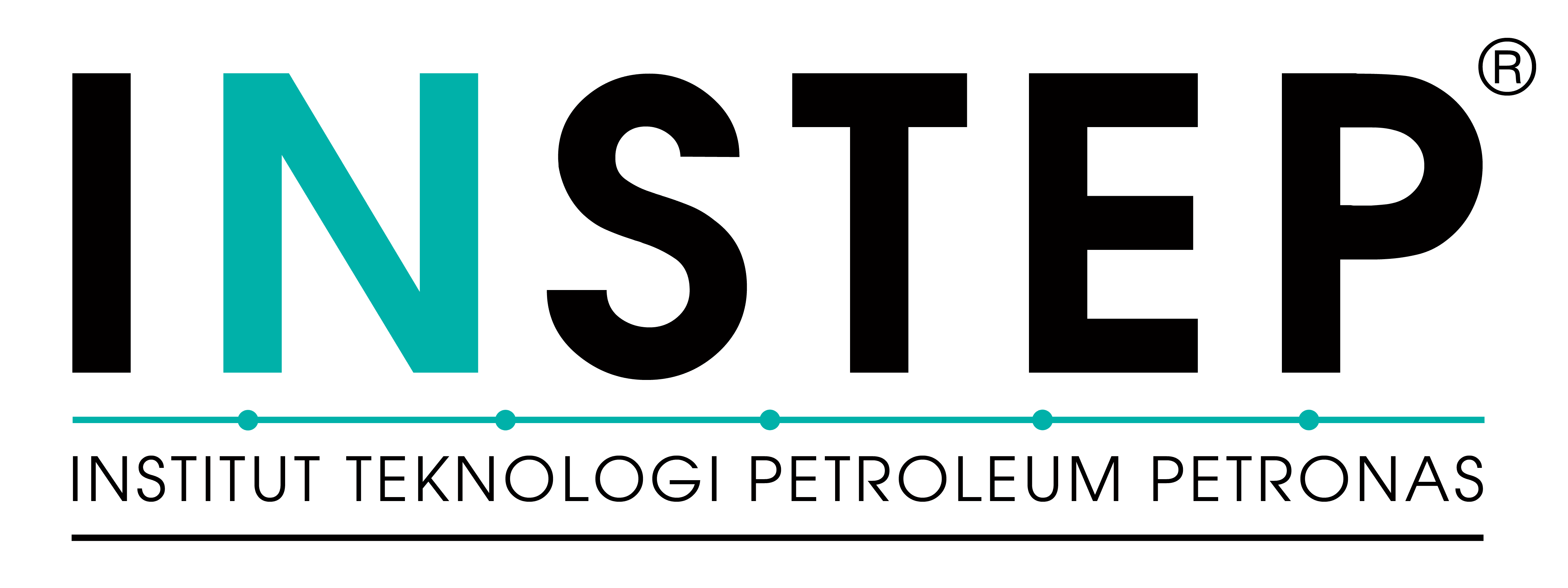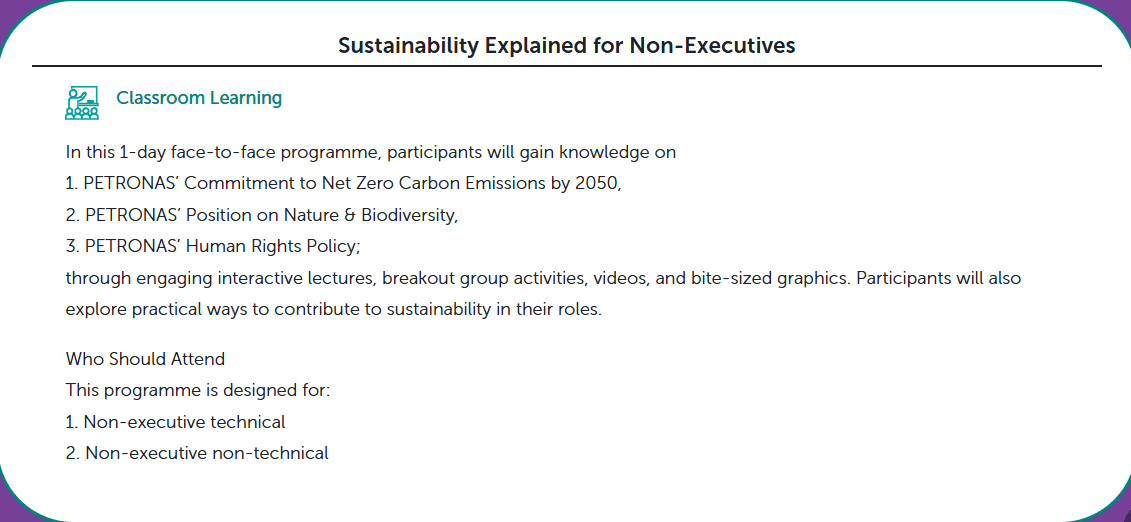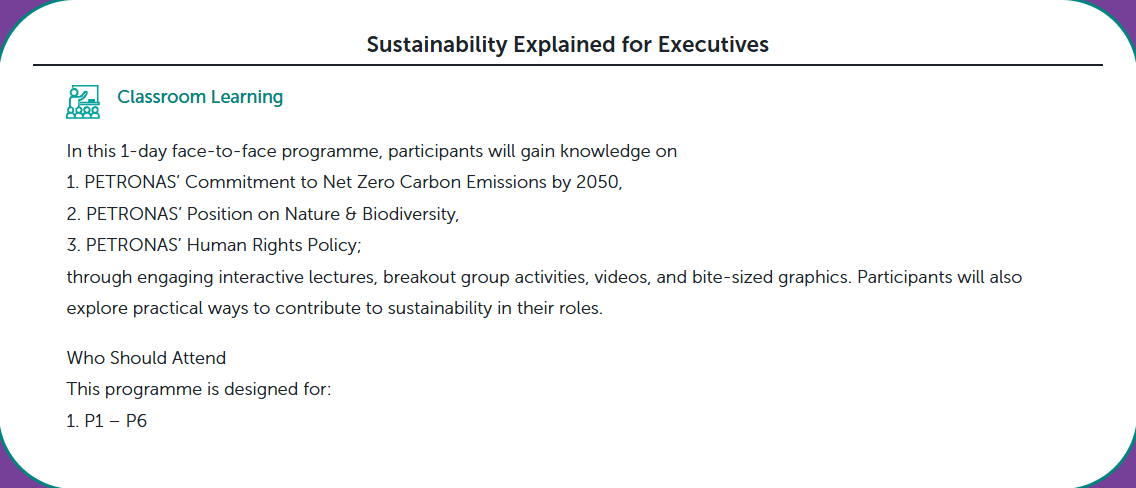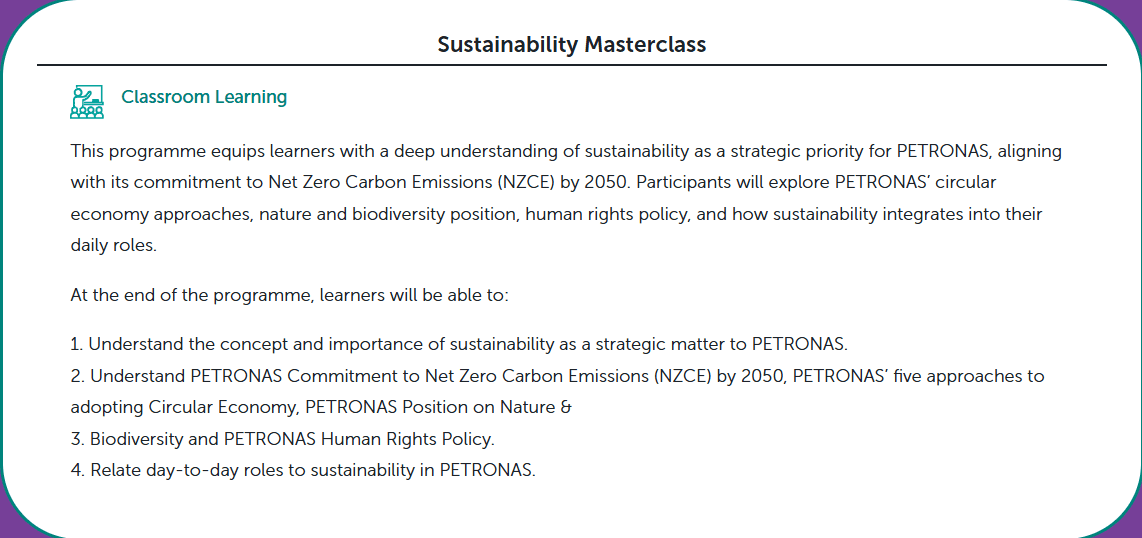The PETRONAS Energy Transition Academy (P-ETA) is INSTEP’s strategic response to the evolving energy landscape, supporting PETRONAS’ aspiration toward Net Zero Carbon Emissions (NZCE) by 2050. This initiative aims to accelerate capability development within PETRONAS and the broader industry, enabling a just and responsible transition toward a lower-carbon future.
Through P-ETA, INSTEP is committed to delivering regionally impactful, internationally recognized training programs. By collaborating with global awarding bodies and academic institutions, we offer cutting-edge learning experiences that equip the workforce with the skills essential for the future of energy. Complementing these programs are our transition-ready facilities, providing experiential, hands-on training to ensure a competent and adaptable energy workforce.
Core Business
More Energy, Less Emissions
33 Programmes with sustainability embedment
New Business
Capturing New Growth Opportunities
7 Programmes
2 Digital Learning
Net Zero Carbon Emissions
Pathway to Zero
11 Programmes
6 Digital Learning
Integrating sustainability and energy transitions element into existing training portfolios for the core business.
Cultivating upskilling and reskilling capability development for the workforce to operate in emerging opportunities and build skills for the future of energy.
Accelerate capabilities to implement decarbonisation strategies in compliance with regulations and beyond, striving to achieve NZCE 2050.
Ask Our Experts
Director of P-ETA
Sustainability and Decarbonization Solutions
Cleaner Energy Solutions
Energy Efficiency Solutions
Apprenticeship Solutions
At the heart of a successful energy transition lies the strength of our people. P-ETA’s learning solutions are thoughtfully curated to equip talents with the critical skills, global perspectives, and forward-thinking mindset required to thrive in a low-carbon economy.
Rooted in PETRONAS’ purpose to progress sustainably and deliver energy solutions that fuel growth, our programmes go beyond technical upskilling. They are strategically aligned with our Net Zero ambitions, designed to foster innovation, accelerate digital fluency, and embed sustainability principles across all levels of the workforce.
We partner with world-class academic institutions, certification bodies, and industry experts to deliver:
- Internationally recognized certifications
- Experiential, hands-on learning
- Cross-disciplinary modules spanning technology, leadership, and sustainability
- Customised pathways for upskilling and reskilling
These solutions are not only preparing individuals for the demands of today, but also cultivating the leadership and resilience required for the energy systems of tomorrow.
Together, we are creating a generation of professionals who will lead with purpose and shape a future that is cleaner, smarter, and more sustainable.
Sustainability Explained for Non-Executives
Classroom Learning
In this 1-day face-to-face programme, participants will gain knowledge on
1. PETRONAS’ Commitment to Net Zero Carbon Emissions by 2050,
2. PETRONAS’ Position on Nature & Biodiversity,
3. PETRONAS’ Human Rights Policy;
through engaging interactive lectures, breakout group activities, videos, and bite-sized graphics. Participants will also explore practical ways to contribute to sustainability in their roles.
Who Should Attend
This programme is designed for:
1. Non-executive technical
2. Non-executive non-technical
Sustainability Explained for Executives
Classroom Learning
In this 1-day face-to-face programme, participants will gain knowledge on
1. PETRONAS’ Commitment to Net Zero Carbon Emissions by 2050,
2. PETRONAS’ Position on Nature & Biodiversity,
3. PETRONAS’ Human Rights Policy;
through engaging interactive lectures, breakout group activities, videos, and bite-sized graphics. Participants will also explore practical ways to contribute to sustainability in their roles.
Who Should Attend
This programme is designed for:
1. P1 – P6
Sustainability Masterclass
Classroom Learning
This programme equips learners with a deep understanding of sustainability as a strategic priority for PETRONAS, aligning with its commitment to Net Zero Carbon Emissions (NZCE) by 2050. Participants will explore PETRONAS’ circular economy approaches, nature and biodiversity position, human rights policy, and how sustainability integrates into their daily roles.
At the end of the programme, learners will be able to:
1. Understand the concept and importance of sustainability as a strategic matter to PETRONAS.
2. Understand PETRONAS Commitment to Net Zero Carbon Emissions (NZCE) by 2050, PETRONAS’ five approaches to adopting Circular Economy, PETRONAS Position on Nature &
3. Biodiversity and PETRONAS Human Rights Policy.
4. Relate day-to-day roles to sustainability in PETRONAS.
Circular Economy e-Learning
Digital Learning
By the end of this module, you should be able to:
1. Explain what is CE and Linear Economy
2. Explain the benefits of CE.
3. Recall PETRONAS’ CE definition and approaches
4. List PETRONAS’ CE projects
5. Show the relationship between CE, with PETRONAS’ Sustainability Approach and NZCE Pathway
Advanced Materials (AM) e-Learning Module
Digital Learning
By the end of this module, learners should be able to:
1. Recognise the contribution of Advanced Materials from PETRONAS – Innovation of Growth Initiatives and PETRONAS MFT 50.30.0 perspectives.
2. Understand the focus and prioritisation of Graphene Technology Commercialisation within PETRONAS.
3. Explain and describe Graphene Properties and Applications.
Decarbonisation Programme for Decarbonisation Enablers*
Classroom Learning
This 1-day programme covers the technical understanding on the application of main decarbonisation levers; supplemented by knowledge on GHG accounting & forecasting, carbon pricing and project economics.
By the end of the programme, participants will be able to:
1. Articulate PETRONAS climate commitments to ensure enterprise-wide coordination across PETRONAS in
delivering the commitments and targets
2. Identify material emission sources, relevant decarbonisation levers and potential GHG emissions
reduction
3. Enable the asset-specific decarbonisation efforts and support enterprise-wide efforts
Decarbonisation Programme for Decarbonisation Focals*
Classroom Learning
This 5-days programme covers the technical understanding on the application of main decarbonization levers; supplemented by knowledge on GHG accounting & forecasting, carbon pricing and project economics.
By the end of the programme, participants will be able to:
1. Articulate PETRONAS climate commitments to ensure enterprise-wide coordination across PETRONAS in
delivering the commitments and targets
2. Demonstrate the understanding of GHG accounting as per GHG Protocol
3. Application of GHG accounting and how it impacts PETRONAS GHG emissions targets
4. Identify material emission sources, relevant decarbonization levers and potential GHG emissions
reduction
5. Demonstrate the understanding of project management fundamental
6. Develop asset specific decarbonization plan with consideration of economic viability
7. Lead the asset-specific decarbonization efforts and support enterprise-wide efforts
Methane Emissions Quantification & Reporting
Digital Learning
By the end of this module, you should be able to:
1. Identify and describe methane emissions, as well as recognise the importance for its mitigation and impact to PETRONAS
2. Aware on available organisations and international standards in governing methane practices
3. Understand the common sources of methane emissions across PETRONAS operations
4. Explain key components for the identification, detection, measurement, quantification, reporting, and verification of methane emissions across PETRONAS gas value chain
5. Understand different types of methane detection and measurement technologies and quantification approaches
6. Understand on methane quantification approaches for all relevant methane emissions sources for PETRONAS gas value chain
Methane Emissions Management in Action byte-sized video
Digital Learning
“Methane Emissions Management in Action” is a byte-sized video that demonstrates Methane Measurement, Quantification & Reporting activities in PETRONAS.
By the end of this video, talents should be able to:
1. Understand the various sources of Methane emissions, through Operational Emissions and Leakages,
2. Gain clarity on Methane quantification technologies i.e. QOGI camera and Clamp-on Ultrasonic Flowmeters,
3. Describe the OGMP 2.0 Gold Standard for Methane emissions reporting.
GHG Accounting
Digital Learning
Greenhouse Gas (GHG) Accounting e-learning module will give an overview about Organisational Carbon Footprinting methodology.
At the end of the session, learners should be able to:
1. Have a good understanding of Organisational Carbon Footprinting methodology covering Scope 1, Scope 2 and Scope 3.
2. Understand the impact of methane emissions and the imperativeness in managing methane emissions.
3. Have an awareness of GHG Forecasting methodology
4. Understand the methodology of conducting Carbon Footprint Assessment for Projects; and Awareness on the 5 GHG Accounting Verification Principles.
GHG Management Standard in PETRONAS, L2
Classroom Learning
This programme focuses on providing an overview of climate change and GHG emissions management. It is designed for both technical and non-technical personnel who require knowledge-level competency, including those in Sustainability, Finance, HSE Management, and Operations & Maintenance Engineering roles.
GHG Accounting Practices, L3
Classroom Learning
This programme provides hands-on training using GHG calculator tools. It is intended for personnel with specific technical job scopes related to GHG accounting.
Carbon Capture, Utilisation & Storage (CCUS) 101
Digital Learning
The basic of CCUS including capture, transport, storage and monitoring, economics and risks as well as the challenges of the current technology of geological storage, monitoring and verification including examples from working projects in PETRONAS.
Here are the learning contents for this e-learning module:
1. Sustainable Development & PETRONAS Aspiration
2. Introduction to Carbon Capture, Utilisation & Storage (CCUS)
3. CCUS in PETRONAS
4. CCUS Techno-Economics & Risks Module
5. Key Takeaways
Mastering Carbon Capture and Storage Value Chain
Classroom Learning
By the end of the programme, learners should be able to
1. Understand the concept and importance of sustainability as a strategic matter to PETRONAS
2. Describe the key stages and technologies involved in the CCS value chain.
3. Identify the health, safety, and environmental risks associated with CCS and their mitigation measures.
4. Outline the key phases of CCS storage development and their design considerations.
5. Summarize the operational and maintenance requirements for CCS systems.
6. Explain the key economic factors influencing CCS project feasibility.
7. Interpret key challenges and lessons from past CCS projects to improve future scalability.
* Open for External
Energy Efficiency on Electrical System*
Classroom Learning
This course introduces the participants to the basic concept of sustainability and the UN Sustainable Development Goal with focuses on energy transitions and energy efficiency towards low carbon society. The content provides participants with the knowledge on energy consumption, energy efficiency, global and local energy scenarios and energy policies. The course also includes the discussions of the role of current and future technologies for sustainability. The course continues with deliberation on change behavior towards energy management and empowering oil and gas industry with sustainability policy.
Registered Energy Manager (REM) Type 1 Training Course*
Classroom Learning
The Registered Energy Manager (REM) Type 1 Training Course is a specialised programme designed to equip participants with the essential skills, knowledge, and certification required to become energy management professionals. This course is tailored to meet the regulatory and practical needs of energy managers in Malaysia, in alignment with the Energy Efficiency and Conservation Act (EECA) and other key national energy policies.
Grid-Connected Photovoltaic (PV) System Course for Wireman and Chargeman*
Classroom Learning
Grid-Connected Photovoltaic (PV) System Course for Wireman and Chargeman is a 5-day course structured to intensify human capital development in Malaysia RE industry especially in solar PV. Among the objective of the course is to expose the wireman and chargeman in Malaysia with regards to solar PV installation dealing with direct current (DC) side and components.
Operation and Maintenance of ENMCS & Integrated IMCS*
Classroom Learning
Integrated Monitoring Control System (IMCS). The programme covers basic architecture, specifications and maintenance of the ENMCS & IMCS with Oil and Gas Industry practices.
Upon completion of the programme, learners should be able to:
1. Describe the design architecture, functions & components, and design specifications of the ENMCS
2. Describe the design architecture, functions & components, and design specifications of the IMCS
3. Perform the PM activities on the ENMCS and IMCS
4. Perform the CM activities on the ENMCS and IMCS
Net Zero Carbon Emissions
Classroom Learning
REM CDP: Steam Systems
Steam Systems focuses on technical, operational and energy efficiency in energy optimisation, through identified opportunities including current and future best practices and technologies.
* Open for External
Unleashing Renewable Energy*
Classroom Learning
This module covers key renewable energy technologies, including solar, wind, ocean and hydropower, hydrogen, and geothermal. Participants will explore the challenges and opportunities of moving toward a sustainable energy future, focusing on how renewables can drive the energy transition and reshape the global energy landscape.
By the end of the program, participants will be able to:
1. Understand the concepts of renewable energy, its application and value chains
2. Explain renewable energy applications and technologies (solar, wind, ocean, hydropower, hydrogen, geothermal)
3. Understanding renewable energy policies and guidelines
4. Translate renewable energy applications into own portfolios
Hydrogen 101 e-Learning
Digital Learning
At the end of the module, you should be able to learn:
1. The global energy landscape has been shifting towards more sustainable alternatives to achieve decarbonisation goals, thereby reducing greenhouse gas emissions.
2. Hydrogen can play an important role in diversifying the sustainable energy mix alongside renewable energy and bio-fuels as it is versatile and can be integrated well with these alternatives.
Sustainable Energy & BESS, L1
Classroom Learning
This module provides participants with in-depth knowledge and skills mainly in applying renewal energy such as Solar and Wind energy to replace or complement the hydrocarbon driven power generation in Oil and Gas industries. The module covers from the fundamental concept of green energy including the operational and maintenance aspect in order to optimize the application of the system.
Upon completion of the programme, participants will be able to:
1. Explain the benefits of using green energy as an alternative power source
2. Describe the techniques in generating power from green energy e.g. Solar, Wind, Fuel Cell, Tidal, Biomass
3. Identify legislation applied in Malaysia.
Sustainable Energy & BESS, L2
Classroom Learning
This module provides participants with in-depth knowledge and skills mainly in applying renewal energy such as Solar and Wind energy to replace or complement the hydrocarbon driven power generation in Oil and Gas industries. The module covers from the fundamental concept of green energy including the operational and maintenance aspect in order to optimize the application of the system.
Upon completion of the programme, participants will be able to:
1. Explain the benefits of using green energy as an alternative power source
2. Describe the techniques in generating power from green energy e.g. Solar, Wind, Fuel Cell, Tidal, Biomass
3. Identify legislation applied in Malaysia.
Operation and Maintenance of Solar Energy Equipment*
Classroom Learning
This module provides participants with vital knowledge and skills in operating and maintaining Solar Energy equipment in line with good engineering practices.In addition, the module will also highlight important characteristic of the solar energy when operating Off- grid or On-grid.
Upon completion of the programme, learners will be able to:
1. Explain the concept of power generator using solar equipment
2. Describe the function of solar equipment
3. Explain the maintenance requirements of each solar equipment
4. Differentiate between off-grid and on-grid operation
Basic Design and Installation of Solar Photovoltaic (PV) System*
Classroom Learning
This programme provides participants with fundamental knowledge and skills in designing, installing and commissioning of Solar PV System in accordance with local and international standards.
Upon completion of the programme, talents should be able to:
PO1 : Describe basic terminologies and main components for Solar Energy & PV System (C1, C2)
PO2 : Describe basic requirements in designing the Solar PV System based on MS 1837 standard (C3,
PO3 : Explain installation requirements for Solar PV System based on MS 1837 standard (C4)
P04 : Perform testing and measurement of Solar PV System (C5 & C6)
Introduction to Renewable Energy and Facilities of Future Level 2
Classroom Learning
In this 2-day programme, participants will be able to gain awareness and knowledge on rotating equipment related to renewable energy, facilities of future and able to evaluate the technology based on existing methodologies. The targeted participant for this programme is for SKG12 mechanical fraternity and related discipline.
At the end of this programme, participants will be able to:
1. Understand the renewable energy and facilities of future related to rotating equipment
2. Assist with the evaluation of renewable energy and facilities of future field applications
Basic Equipment & Maintenance of Solar Photovoltaic System
Digital Learning
This course introduces the essential components of solar photovoltaic systems, including panels, inverters, and batteries, and focuses on key maintenance practices. It covers installation basics, troubleshooting, and safety measures to ensure efficient and reliable system performance over time.
* Open for External
Transition-Ready Facilities
INSTEP has started to expand the role of Upstream Downstream Training Plant (UDTP) via testing and deployment of technology since 2020
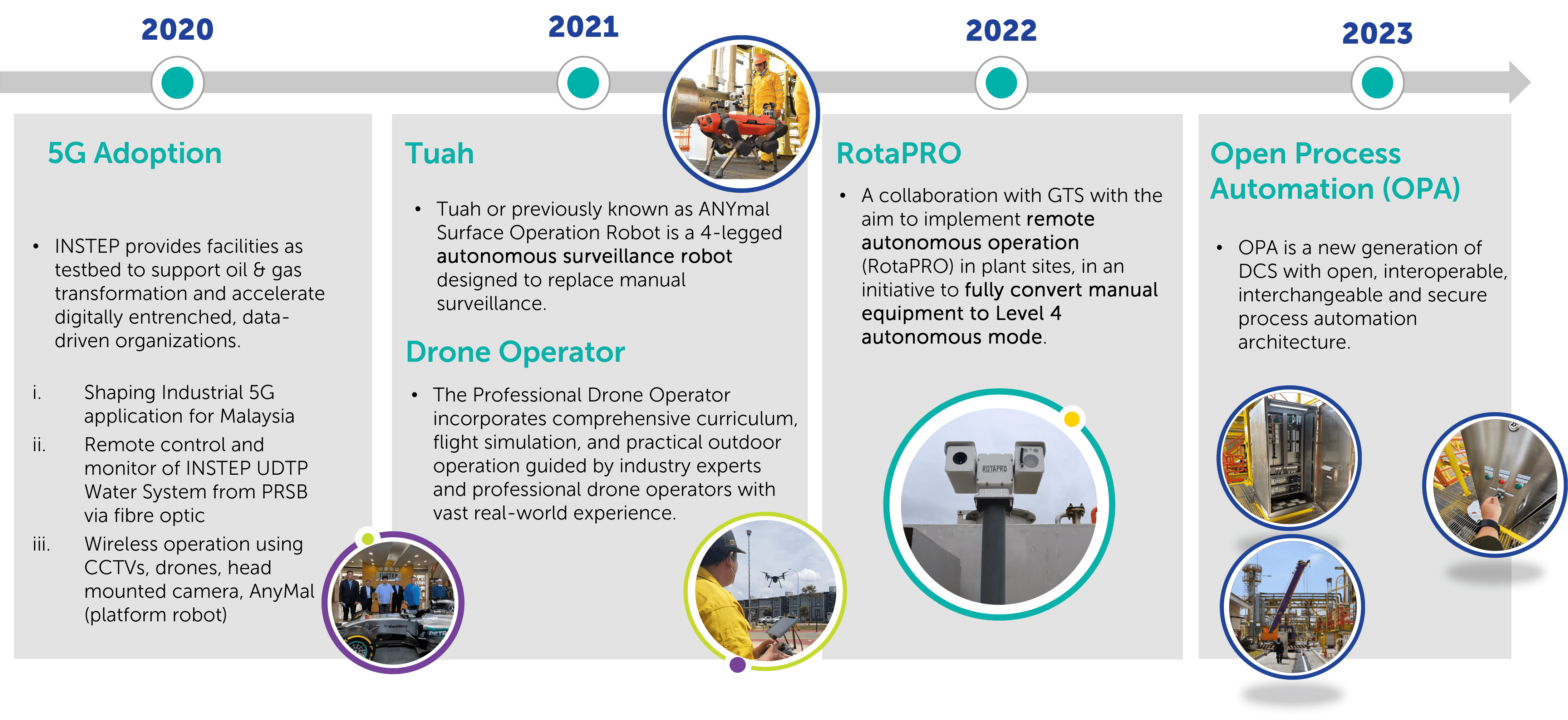
Future Facilities
CEFORE
CEFORE (Centre of Offshore Renewable Energy) is a cutting-edge training ground for offshore renewable energy solutions. It features a round-the-clock hybrid mix of offshore floating solar, wind turbines, wave energy converters, and onshore rooftop photovoltaics—integrated with a 1.2MWh Battery Energy Storage System (BESS) and advanced Energy Management Systems (EMS). With a total generation capacity of 330kWp, CEFORE showcases how diversified renewable sources can overcome intermittency and reduce reliance on land-based systems by leveraging Malaysia’s vast coastlines.
As a strategic platform, CEFORE offers immersive, hands-on exposure to real-world offshore and onshore applications. It supports comprehensive learning in system operations, asset management, and project execution. By fostering regional expertise, accelerating the energy transition, and cultivating future-ready talent, CEFORE empowers professionals to lead in the evolving renewable energy landscape.
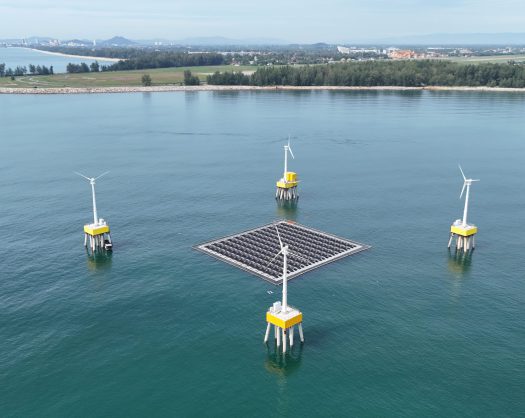
SEA METEC
Southeast Asia Methane Emissions Technology Evaluation Center (SEA METEC) is a regional-first facility that marks a significant milestone for PETRONAS and ASEAN energy players in advancing methane emissions abatement efforts.
SEA METEC is designed to simulate real-world conditions specific to the Southeast Asia context, enabling energy sector companies across the region to validate and refine their methane emissions measurement and quantification technologies before deployment at live operating facilities.
Beyond technology validation, SEA METEC will serve as a dedicated training ground for ASEAN field operators, strengthening regional capabilities and accelerating practical know-how in emissions management for a more sustainable energy future.
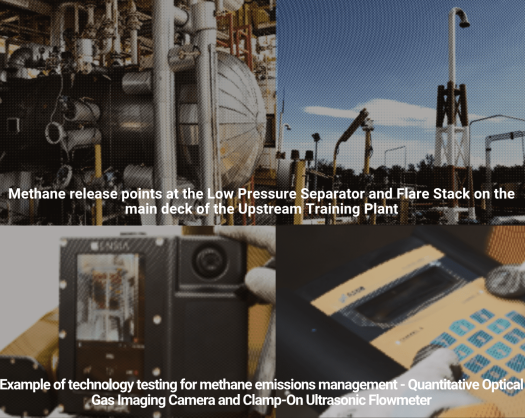
GCPV
INSTEP is equipped with Grid-Connected Photovoltaic (GCPV) training facilities, designed to meet the rising demand for skilled professionals in Malaysia’s renewable energy sector. The facilities support both theoretical instruction and hands-on practical training, ensuring participants are well prepared for real-world industry applications.
In 2025, INSTEP is recognized as training partners by the Sustainable Energy Development Authority (SEDA) Malaysia, enabling us to offer GCPV training for wiremen and chargemen, as well as future operations and maintenance programmes.
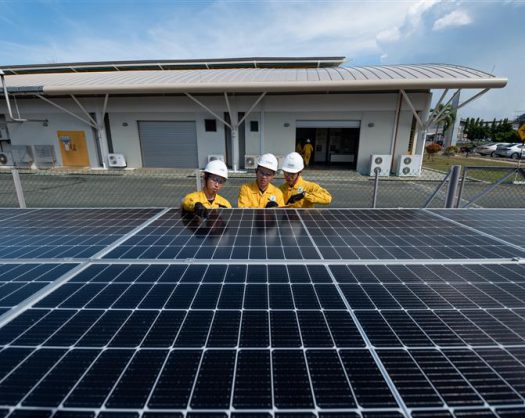
Our Partners
INSTEP highly values the synergy and close partnerships with our stakeholders, ranging from government agencies, energy companies, government-linked companies, industry associations, higher learning institutions and international oil & gas host authorities. INSTEP also welcomes new collaboration opportunities within the oil & gas industry while striving to achieve mutual benefits for all parties.
Educational & Professional Institutions





Regulatory & Governmental Bodies






The PETRONAS Energy Transition Academy (P-ETA) is INSTEP’s strategic response to the evolving energy landscape, supporting PETRONAS’ aspiration toward Net Zero Carbon Emissions (NZCE) by 2050. This initiative aims to accelerate capability development within PETRONAS and the broader industry, enabling a just and responsible transition toward a lower-carbon future.
Through P-ETA, INSTEP is committed to delivering regionally impactful, internationally recognized training programs. By collaborating with global awarding bodies and academic institutions, we offer cutting-edge learning experiences that equip the workforce with the skills essential for the future of energy. Complementing these programs are our transition-ready facilities, providing experiential, hands-on training to ensure a competent and adaptable energy workforce.
Core Business
More Energy, Less Emissions
33 programmes with sustainability embedment
Integrating sustainability and energy transition elements into existing training portfolios for the core business
New Business
Capturing New Growth Opportunities
7 programmes
2 Digital Learning
Cultivating upskilling and reskilling capability development for the workforce to operate in emerging opportunities and build skills for the future of energy.
Net Zero Carbon Emissions
Pathway to Zero
11 programmes
6 Digital Learnings
Accelerate capabilities to implement decarbonization strategies in compliance with regulations and beyond, striving to achieve NZCE 2050.
Ask Our Experts
At the heart of a successful energy transition lies the strength of our people. P-ETA’s learning solutions are thoughtfully curated to equip talents with the critical skills, global perspectives, and forward-thinking mindset required to thrive in a low-carbon economy.
Rooted in PETRONAS’ purpose to progress sustainably and deliver energy solutions that fuel growth, our programmes go beyond technical upskilling. They are strategically aligned with our Net Zero ambitions, designed to foster innovation, accelerate digital fluency, and embed sustainability principles across all levels of the workforce.
We partner with world-class academic institutions, certification bodies, and industry experts to deliver:
- Internationally recognized certifications
- Experiential, hands-on learning
- Cross-disciplinary modules spanning technology, leadership, and sustainability
- Customised pathways for upskilling and reskilling
These solutions are not only preparing individuals for the demands of today, but also cultivating the leadership and resilience required for the energy systems of tomorrow.
Together, we are creating a generation of professionals who will lead with purpose and shape a future that is cleaner, smarter, and more sustainable.
- All
- Sustainability
- Decarbonisation
- Energy Efficiency
- Cleaner Energy
Transition-Ready Facilities
INSTEP has started to expand the role of Upstream Downstream Training Plant (UDTP) via testing and deployment of technology since 2020

Future Facilities
CEFORE
CEFORE (Centre of Offshore Renewable Energy) is a cutting-edge training ground for offshore renewable energy solutions. It features a round-the-clock hybrid mix of offshore floating solar, wind turbines, wave energy converters, and onshore rooftop photovoltaics—integrated with a 1.2MWh Battery Energy Storage System (BESS) and advanced Energy Management Systems (EMS). With a total generation capacity of 330kWp, CEFORE showcases how diversified renewable sources can overcome intermittency and reduce reliance on land-based systems by leveraging Malaysia’s vast coastlines.
As a strategic platform, CEFORE offers immersive, hands-on exposure to real-world offshore and onshore applications. It supports comprehensive learning in system operations, asset management, and project execution. By fostering regional expertise, accelerating the energy transition, and cultivating future-ready talent, CEFORE empowers professionals to lead in the evolving renewable energy landscape.

SEA METEC
Southeast Asia Methane Emissions Technology Evaluation Center (SEA METEC) is a regional-first facility that marks a significant milestone for PETRONAS and ASEAN energy players in advancing methane emissions abatement efforts.
SEA METEC is designed to simulate real-world conditions specific to the Southeast Asia context, enabling energy sector companies across the region to validate and refine their methane emissions measurement and quantification technologies before deployment at live operating facilities.
Beyond technology validation, SEA METEC will serve as a dedicated training ground for ASEAN field operators, strengthening regional capabilities and accelerating practical know-how in emissions management for a more sustainable energy future.

GCPV
INSTEP is equipped with Grid-Connected Photovoltaic (GCPV) training facilities, designed to meet the rising demand for skilled professionals in Malaysia’s renewable energy sector. The facilities support both theoretical instruction and hands-on practical training, ensuring participants are well prepared for real-world industry applications.
In 2025, INSTEP is recognized as training partners by the Sustainable Energy Development Authority (SEDA) Malaysia, enabling us to offer GCPV training for wiremen and chargemen, as well as future operations and maintenance programmes.

Our Partners
INSTEP highly values the synergy and close partnerships with our stakeholders, ranging from government agencies, energy companies, government-linked companies, industry associations, higher learning institutions and international oil & gas host authorities. INSTEP also welcomes new collaboration opportunities within the oil & gas industry while striving to achieve mutual benefits for all parties.
Educational & Professional Institutions





Regulatory & Governmental Bodies






Know more about P-ETA
Download Learning Calendar
Don’t miss out and join us to upskill yourself. Download your copy today!
Discover CePSWaM
Certified Training Provider by Environment Institute of Malaysia (EiMAS)
Stay Connected with Us
Sign up for email updates and be the first to know of the latest developments from INSTEP.
